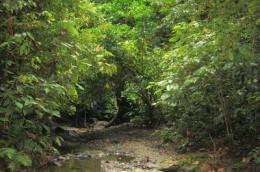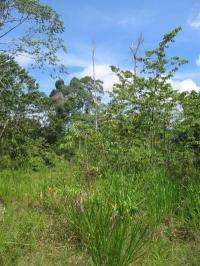Leaf litter ants advance case for rainforest conservation in Borneo

Studies of ant populations in Borneo reveal an unexpected resilience to areas of rainforest degraded by repeated intensive logging, a finding which conservationists hope will lead governments to conserve these areas rather than allow them to be cleared and used for cash crop plantations.
Leaf litter ants are often used to measure the overall ecological health of an area because of the large number of species present and because the health of the leaf litter is a good indication of the overall health of the forest.
It is commonly assumed that repeated logging of rainforests has catastrophic effects on biodiversity. However, studies by Leeds ecologists in northern Borneo, where timber harvests are among the highest globally, have shown that in fact over 80% of ant species found in pristine, unlogged forest were also found in forest that had been logged twice.
The findings have implications for forest conservation as areas of forest where intensive logging has been carried out are typically thought to have little conservation value and are often allowed to be cleared entirely to make way for cash crops such as oil palm.

Keith Hamer, a Reader in Animal Ecology at the Institute of Integrative & Comparative Biology, led the study. He explains: "Rainforests in Borneo are managed through a system called 'selective logging'. In this system, not all the trees are harvested, only the largest, commercially valuable trees. This is supposed to be a sustainable system, but in practice the intensity of harvesting is often too high and areas are then liable to be logged a second time before they have had a chance properly to regenerate.
"These repeatedly logged areas can look awful, with big gaps in the tree canopy which are then invaded by grasses, leading to arguments that such areas are too badly degraded for conservation."
Dr Hamer added: "The logging clearly does have an effect on ant populations but it's not nearly as disastrous as might be expected. These areas are able to support much more diverse communities than oil palm plantations but large areas are still being converted. Preventing this needs to be a priority for policy-makers and conservationists in the region."
The study is part of the Royal Society's Southeast Asia Rainforest Research Programme and is published in a special edition of the Philosophical Transactions of the Royal Society. It was supported by a grant from the Leverhulme Trust.
Provided by University of Leeds


















